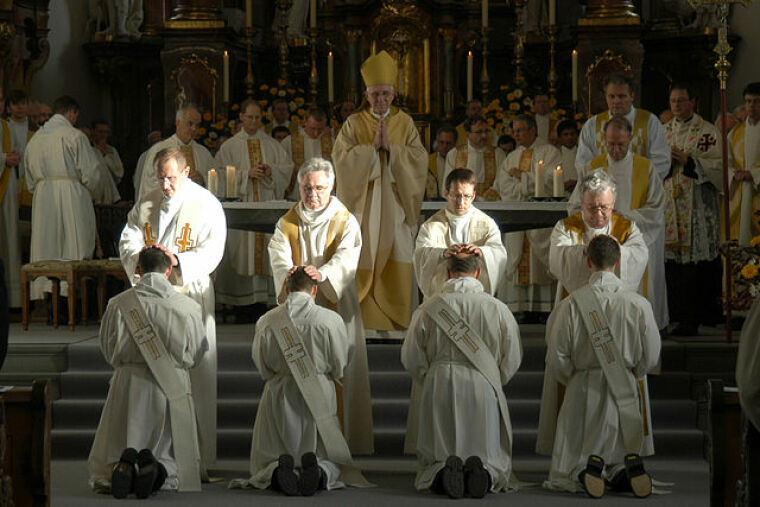Better screening for priesthood needed to attract the right candidates, says Archbishop of Dublin
Diarmuid Martin, the Archbishop of Dublin, acknowledged that better admission standards are needed to attract new priests.
Martin issued a statement to RTE Radio's Morning Ireland on Thursday regarding the issues facing the Maynooth seminary. The Trustees of the National Seminary ordered a review of the usage of social media by priests-in-training after allegations were made that some of the trainees used Grindr, a dating app for gay people.

"Maynooth is not to be condemned but it is not to be canonized either," Martin told RTE. He added that the seminary has to change, "not just because of current allegations but because of the fact that we are living in a different world."
"I've never criticized the teaching in Maynooth, this is something people have said is behind my activity. That isn't what I've been talking about at all," the archbishop added.
The trustees released a statement on Wednesday asking for a review of policies on whistle-blowing and policies regarding the use of the internet and social media. The trustees also asked the Bishops' Conference for an independent audit of governance in the seminaries. They also called for a standard national policy for admissions and the introduction of a pre-seminary year for applicants to the priesthood.
Dominican priest Fr. Gerard Dunne agreed with Martin and told the Irish Independent that Martin is currently seeking a standardization of admissions procedures for all dioceses.
"In my experience, this process has been haphazard in the past. Different dioceses in Ireland employ different assessment methods – some are rigorous, others not so," Dunne said.
Dunne added that candidates should experience life in the parish and have at least a year of discernment with a vocations director.
Martin told RTE that seminaries will continue to exist but the preparation of priests will go beyond the walls of the seminary. He added that training for priesthood should take part in realities where there are variations in religious culture.
 Christians don't have to affirm transgenderism, but they can’t express that view at work: tribunal
Christians don't have to affirm transgenderism, but they can’t express that view at work: tribunal Archaeology discovery: Medieval Christian prayer beads found on Holy Island
Archaeology discovery: Medieval Christian prayer beads found on Holy Island Presbyterian Church in America votes to leave National Association of Evangelicals
Presbyterian Church in America votes to leave National Association of Evangelicals Over 50 killed in 'vile and satanic' attack at Nigerian church on Pentecost Sunday
Over 50 killed in 'vile and satanic' attack at Nigerian church on Pentecost Sunday Ukrainian Orthodox Church severs ties with Moscow over Patriarch Kirill's support for Putin's war
Ukrainian Orthodox Church severs ties with Moscow over Patriarch Kirill's support for Putin's war Islamic State kills 20 Nigerian Christians as revenge for US airstrike
Islamic State kills 20 Nigerian Christians as revenge for US airstrike Man who served 33 years in prison for murder leads inmates to Christ
Man who served 33 years in prison for murder leads inmates to Christ


 Nigerian student beaten to death, body burned over ‘blasphemous’ WhatsApp message
Nigerian student beaten to death, body burned over ‘blasphemous’ WhatsApp message 'A new low': World reacts after Hong Kong arrests 90-year-old Cardinal Joseph Zen
'A new low': World reacts after Hong Kong arrests 90-year-old Cardinal Joseph Zen Iran sentences Christian man to 10 years in prison for hosting house church worship gathering
Iran sentences Christian man to 10 years in prison for hosting house church worship gathering French Guyana: Pastor shot dead, church set on fire after meeting delegation of Evangelicals
French Guyana: Pastor shot dead, church set on fire after meeting delegation of Evangelicals ‘Talking Jesus’ report finds only 6% of UK adults identify as practicing Christians
‘Talking Jesus’ report finds only 6% of UK adults identify as practicing Christians Mission Eurasia ministry center blown up in Ukraine, hundreds of Bibles destroyed: 'God will provide'
Mission Eurasia ministry center blown up in Ukraine, hundreds of Bibles destroyed: 'God will provide' Church holds service for first time after ISIS desecrated it 8 years ago
Church holds service for first time after ISIS desecrated it 8 years ago Burger King apologizes for 'offensive campaign' using Jesus' words at the Last Supper
Burger King apologizes for 'offensive campaign' using Jesus' words at the Last Supper Uganda: Muslims abduct teacher, burn him inside mosque for praying in Christ’s name
Uganda: Muslims abduct teacher, burn him inside mosque for praying in Christ’s name